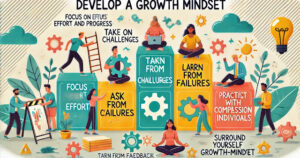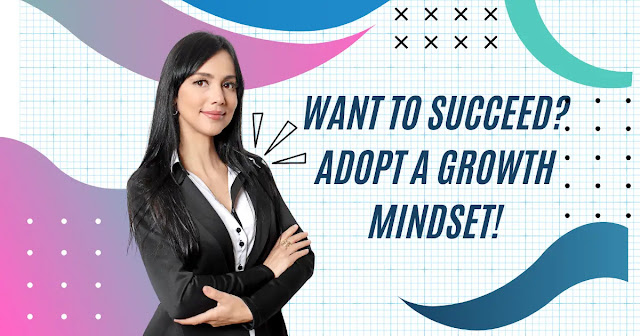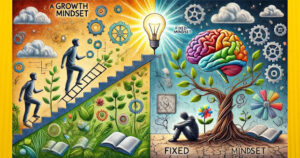Last updated on February 8th, 2026 at 03:50 pm
With a growth mindset, the possibilities are limitless!
Key Takeaways
- Practical Steps: You will find clear, actionable strategies to build a growth mindset in your life.
- Inspiration: Discover real-life examples that show the power of resilience and perseverance.
- Scientific Insights: Learn about the brain’s capacity to grow and adapt through learning and experience.
- Myth-Busting: We clarify common misconceptions about growth mindsets to help you better understand this concept.
- Encouragement: The article motivates you to take on new challenges, learn from your mistakes, and focus on making progress.
What is a Growth Mindset?
A growth mindset is the belief that we can improve our skills and intelligence over time. People with this mindset know intelligence is not fixed, it can change and develop through experience and practice.
Characteristics of a Growth Mindset
2. Staying Strong During Difficulties: They recover from failures and see them as important lessons for success.
4. Celebrating Others’ Success: They find inspiration in others’ achievements and use that motivation to reach their own goals.
5. Focus on Effort: They believe that consistent effort is crucial to achieving success.
Benefits of a Growth Mindset
Having a growth mindset can bring many benefits to your life:
2. Enhanced Learning: A growth mindset helps people love learning. Those with this mindset are 83% more likely to learn new skills and succeed in their careers.
3. Improved Motivation: They stay motivated because they focus on the learning process, not just the final result. Research indicates that employees with a growth mindset are 43% more likely to be engaged in their work.
4. Better Relationships: A growth mindset encourages teamwork and open communication, strengthening personal and professional relationships.
Related read: How to Motivate Team Members as a Leader
Examples of Growth Mindset in Action
1. Serena Williams, Tennis Champion:
Despite facing injuries and personal challenges, Serena Williams has shown incredible resilience. Her comeback after having a baby demonstrates how hard work and belief in growth can lead to success.
2. Elon Musk, Entrepreneur:
Known for his work with Tesla and SpaceX, Elon Musk has faced many setbacks. His ability to learn from failures has allowed him to revolutionize entire industries.
3. J.K. Rowling, Author of Harry Potter:
Rowling faced multiple rejections before her Harry Potter series became famous. Instead of giving up, she used feedback to improve her writing, showing the power of perseverance.
4. A Student Overcoming Academic Struggles:
Understanding Growth Mindset vs. Fixed Mindset
- Views Learning as Ongoing: People with a growth mindset see learning as something that continues throughout life, while those with a fixed mindset think their abilities are unchangeable.
- Takes on Challenges: A growth mindset encourages people to face challenges for personal improvement, whereas a fixed mindset often leads to avoiding challenges due to fear of failing.
- Considers Failure as a Lesson: People with a growth mindset view failures as important lessons, while those with a fixed mindset may see failure as a sign of their limitations.
- Values Effort: A growth mindset highlights the importance of effort in achieving success, unlike the belief in fixed talent.
- Welcomes Constructive Criticism: People with a growth mindset look for ways to improve based on others’ comments, while those with a fixed mindset may ignore or react negatively to criticism.
- Inspired by Others: Individuals with a growth mindset feel motivated by other’s successes, while a fixed mindset can lead to feelings of jealousy or insecurity.
Growth Mindset vs. Fixed Mindset: What’s the Difference?
Growth Mindset:
- Sees challenges as chances to improve.
- Views failures as opportunities to learn.
- Looks for advice to get better.
- Believes hard work leads to success.
- Feels motivated by the achievements of others.
Fixed Mindset:
- Steers clear of challenges to avoid failure.
- Gives up quickly when things get tough.
- Ignores or gets upset by criticism.
- Thinks success comes from natural talent.
- Feels insecure about the success of others.

Want to Succeed? Adopt a Growth Mindset!
How to Develop a Growth Mindset in Your Life
1. Focus on Effort and Progress:
Celebrate the hard work you put into tasks instead of just the outcomes. Notice how far you’ve come and learn from your experiences.
2. Take on Challenges:
Look for new challenges and see them as chances to improve. Whether it’s a difficult project at work or trying a new hobby, pushing yourself helps you grow.
3. Learn from Failures:
Treat mistakes as lessons. Think about what went wrong, learn from it, and apply the knowledge to future tasks.
4. Ask for Feedback:
Ask for feedback from others. Use their insights to improve yourself.
5. Practice Self-Compassion:
Related read: How to develop a positive mindset for personality development
6. Surround Yourself with Growth-Minded Individuals:
Spend time with people who embrace challenges. Their positive attitude will inspire you to adopt a similar mindset.
 |
| Want to Succeed? Adopt a Growth Mindset! |
Growth Mindset for Students and Professionals
For Students:
- Focus on Effort: Encourage students to value hard work over just talent. For example, if a student struggles with a subject like math, they should understand that consistent practice and seeking help can lead to improvement, rather than feeling defeated by poor grades.
- Praise Hard Work: Acknowledge their dedication and effort in tasks. Instead of only praising high scores, teachers and parents can highlight the effort a student puts into studying for an exam, reinforcing the idea that effort is what leads to success.
- Create a Safe Environment: Foster a space where mistakes are viewed as learning opportunities. For instance, in a classroom, teachers can share their own failures and how they learned from them, encouraging students to do the same without fear of judgment.
- Dealing with Exam Stress: When facing exam stress, students can adopt a growth mindset by preparing for tests through effective study techniques. They might use practice exams to identify weak areas, view mistakes as learning opportunities, and develop a study plan that allows for breaks and self-care, understanding that improvement takes time and effort.
For Professionals:
- Promote Continuous Learning: Encourage ongoing education and skill development.
For example, professionals can take online courses or attend workshops to learn new tools or methods relevant to their field, embracing the idea that skills can always be enhanced.
- Take on New Responsibilities: Embrace new tasks to grow in your role. A professional might volunteer to lead a project outside their usual responsibilities. This willingness to step outside their comfort zone can lead to new skills and opportunities for advancement.
- Ask for Input: Request opinions from others to improve and enhance job performance.
For instance, after completing a project, a professional could seek feedback from colleagues to identify areas for improvement, showing that they value growth over a fixed perception of their abilities.
- Adapting to Workplace Challenges: In a rapidly changing work environment, professionals often face new challenges, such as adopting new technologies or shifting team dynamics. A growth mindset encourages them to see these changes as opportunities for learning.
For example, if a new software is introduced, instead of resisting it, they can take initiative to learn and master it, viewing it as a way to enhance their skill set and contribute to the team’s success.
Science Behind a Growth Mindset
Studies have shown that individuals with a growth mindset exhibit greater brain activity in regions associated with learning and problem-solving, reinforcing the idea that effort leads to improvement.
Common Misconceptions About Growth Mindset
2. Myth: It’s Too Late to Change Mindsets: Many believe that mindsets are set in stone, but research shows that anyone can cultivate a growth mindset regardless of age or background.
3. Myth: A Growth Mindset Guarantees Success: Having a growth mindset does not guarantee success on its own, it must be paired with effort and action.
Conclusion:
A growth mindset helps us believe that we can improve at anything through hard work, learning, and practice. It encourages us to view challenges as opportunities, learn from our mistakes, and continue growing.
“Success is the ability to go from failure to failure without losing your enthusiasm.” – Winston Churchill.
“Whether you think you can or you think you can’t, you are right.” – Henry Ford


